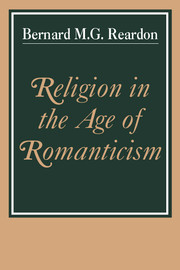Book contents
- Frontmatter
- Contents
- Preface
- 1 Romanticism, idealism and religious belief
- 2 Schleiermacher on the religious consciousness
- 3 Hegel and Christianity
- 4 The idea of God in the philosophy of Schelling
- 5 German Catholic theology in the Romantic era
- 6 Italian ontologism: Gioberti and Rosmini
- 7 Lamennais and Paroles d'un Croyant
- 8 Auguste Comte and the Religion of Humanity
- 9 Ernest Renan and the Religion of Science
- Notes
- Index
3 - Hegel and Christianity
Published online by Cambridge University Press: 05 June 2012
- Frontmatter
- Contents
- Preface
- 1 Romanticism, idealism and religious belief
- 2 Schleiermacher on the religious consciousness
- 3 Hegel and Christianity
- 4 The idea of God in the philosophy of Schelling
- 5 German Catholic theology in the Romantic era
- 6 Italian ontologism: Gioberti and Rosmini
- 7 Lamennais and Paroles d'un Croyant
- 8 Auguste Comte and the Religion of Humanity
- 9 Ernest Renan and the Religion of Science
- Notes
- Index
Summary
If Schleiermacher, reflecting here the Romantic temper in what perhaps was most characteristic of it, discovered the essence of religion in feeling, his great contemporary and, in later years, colleague at the university of Berlin, Georg Wilhelm Friedrich Hegel (1770–1831), found it in knowledge, elevated to the status of total rational comprehension. In this regard the philosopher was a legitimate son of the eighteenth century, for the justification of reason as the proper expression of mind he never questioned, provided that reason be interpreted speculatively in the all-embracing manner he himself envisaged; for the Aufklärung, he judged, had been in error not in what it saw but in what it failed to see. Here indeed the insights of romanticism – above all its sense of the unity of finite and infinite, of objective and subjective – went far beyond the grasp of rationalism as commonly understood. For Hegel, therefore, the problem of religion remained primarily intellectual, although one the solution of which required to be stated in terms very different from anything the deists, or even Kant, had essayed. A new synthesis had to be attempted; grounded it might be in Spinoza, but, following Herder, apprehending reality in its indispensable historical dimension. To Hegel history is the realm of truth in which Spirit achieves its final and absolute manifestation, and his profound respect for the historical as unending process is what, more than anything else, obliges us to place him among the Romantics of his period.
- Type
- Chapter
- Information
- Religion in the Age of RomanticismStudies in Early Nineteenth-Century Thought, pp. 59 - 87Publisher: Cambridge University PressPrint publication year: 1985



